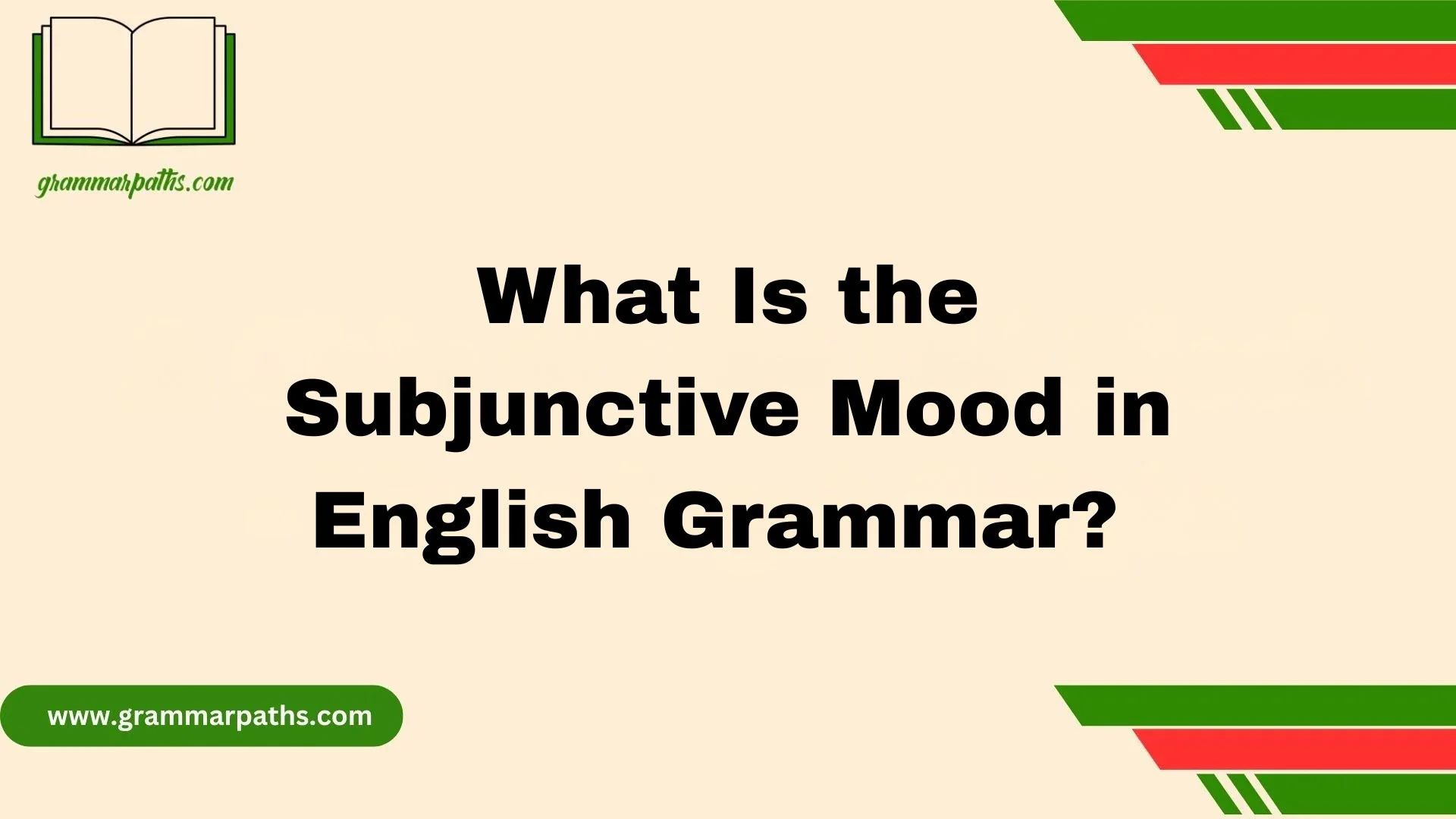In English grammar, the subjunctive mood is a special verb form used to express wishes, hypothetical situations, demands, suggestions, or possibilities. Unlike the indicative mood, which states facts, or the imperative mood, which gives commands, the subjunctive allows speakers and writers to talk about events that are not certain, unreal, or desired. Understanding this mood is essential for mastering advanced grammar, as it often appears in formal writing, academic English, and classic literature.
The subjunctive mood in English can feel tricky because it doesn’t always follow standard verb conjugation rules. For example, instead of saying “He was,” we use “He were” in phrases like “If he were taller, he could play basketball.” This shows that the action is imaginary or contrary to fact. You will also see it in expressions like “I suggest that he study harder” or “It is essential that she be on time.”
By learning the rules of the subjunctive mood with clear examples in sentences, you’ll gain the ability to write and speak with greater precision. This guide will cover its uses, forms, and common mistakes, giving you a complete overview of this often-misunderstood area of grammar.
What Is the Subjunctive Mood?
In English, verbs can take different moods depending on the function of the sentence. There are three primary moods:
- Indicative mood – states facts and asks questions (e.g., She works hard.)
- Imperative mood – gives commands or requests (e.g., Please close the door.)
- Subjunctive mood – expresses wishes, demands, hypotheticals, or situations contrary to reality (e.g., I wish he were here.)
The subjunctive mood is often described as the “mood of unreality.” It steps outside the realm of what is and moves into what could be, should be, or might have been.
Historically, the subjunctive was far more common in English. Today, it’s less frequent in casual speech, but it still appears in formal contexts, literature, academic writing, and set expressions.
The Present Subjunctive
The present subjunctive is formed using the base form of the verb, regardless of subject. That means no “-s” ending in the third person singular.
How It’s Formed
- I recommend that she study more.
- The teacher insists that he arrive on time.
- It’s essential that you be careful.
Notice that the verbs study, arrive, and be don’t change, even though normally we’d expect studies or arrives in the indicative.
When It’s Used
The present subjunctive shows up in sentences that express:
- Demands: They demanded that he leave immediately.
- Recommendations: I suggest that she apply for the job.
- Necessity: It’s vital that everyone attend the meeting.
- Formal directives: The court ordered that the man be released.
Common Triggers
Here are some common verbs, adjectives, and expressions that often require the subjunctive:
| Verbs | Adjectives | Expressions |
| suggest | important | it is necessary that |
| recommend | essential | it is vital that |
| demand | urgent | it is crucial that |
| insist | advisable | it is recommended that |
The Past Subjunctive
The past subjunctive is easier to recognize, especially because it often uses were instead of was.
How It’s Formed
- If I were you, I’d take the offer.
- She wishes she were taller.
- Suppose he were here right now.
Even when the subject is I, he, or she, the subjunctive form is were, not was.
When It’s Used
The past subjunctive expresses:
- Hypothetical situations: If he were rich, he’d buy a mansion.
- Wishes: I wish it were easier.
- Polite or formal expressions: If I were allowed, I would help.
This form often causes confusion because in everyday speech, many people say was instead of were. However, in writing and formal settings, were remains the correct choice.
Subjunctive vs. Indicative Mood
At first glance, subjunctive and indicative sentences look similar. The difference lies in whether the action is real or hypothetical/desired.
| Indicative (Reality) | Subjunctive (Hypothetical/Desired) |
| She works here. | I suggest she work here. |
| He was tired. | I wish he were less tired. |
| They are ready. | It’s important they be ready. |
Common Mistakes
- I wish I was taller.
- I wish I were taller.
- He recommends she applies.
- He recommends she apply.
The indicative describes what’s happening. The subjunctive deals with what’s imagined, wished, or required.
Subjunctive in Everyday English
You might not hear the subjunctive often in casual conversations, but it still plays an important role in certain areas.
Fixed Expressions That Survive
- God bless you.
- Be that as it may.
- Come what may.
- Heaven forbid.
- So be it.
These phrases preserve older uses of the subjunctive and remain common in both spoken and written English.
Formal and Professional Contexts
The subjunctive frequently appears in legal, political, and academic writing where precision matters. For example:
- The law requires that every document be signed.
- It is imperative that research be conducted thoroughly.
Informal Usage
Native speakers often skip the subjunctive in everyday speech. Instead of saying, “I suggest that he study,” many people say, “I suggest he studies.” Both forms are widely understood, though the first is grammatically correct.
How to Identify the Subjunctive Mood in Sentences
Spotting the subjunctive can feel tricky at first, but these steps help:
- Look for triggers – verbs like recommend, suggest, demand, wish, insist.
- Check the verb form – if it’s a base form without endings or were in hypotheticals, you’ve likely found the subjunctive.
- Ask if it’s real or hypothetical – if the situation is imagined, desired, or required, it’s probably subjunctive.
Examples
- The teacher insists that each student submit the assignment.
- If she were more confident, she would speak up.
- It’s essential that the data be correct.
Writing and Speaking with the Subjunctive
Using the subjunctive correctly shows a higher level of command over English.
Tips for Using It
- Use base verb forms after triggers like suggest, recommend, demand.
- Use were, not was, in unreal conditional sentences.
- Stick to the subjunctive in formal or academic writing, even if casual speech allows alternatives.
Common Errors to Avoid
- Mixing up indicative and subjunctive forms (“He suggests she goes” instead of “He suggests she go”).
- Forgetting to use were in hypotheticals.
- Overusing it in casual conversations where it sounds unnatural.
Practice Sentences
- I recommend that she be on time.
- If I were rich, I’d donate more.
- They insisted that the room be cleaned.
Case Studies & Real-Life Examples
In Literature
Shakespeare frequently used the subjunctive, often to heighten drama or express desires:
- “If music be the food of love, play on.” (Twelfth Night)
- “I wish you were a dog, that I might love you something.”
In Politics and Speeches
Formal speeches often preserve the subjunctive for clarity:
- “We demand that justice be served.”
- “It is essential that freedom be protected.”
British vs. American Usage
- American English: More consistent in using the subjunctive, especially in formal writing.
- British English: Tends to prefer modal verbs (e.g., “I suggest he should go” instead of “I suggest he go”).
Common Expressions and Idioms with the Subjunctive
Certain phrases have become idiomatic, keeping the subjunctive alive:
- If I were you – giving advice
- As it were – adding a metaphorical twist
- So be it – accepting a situation
- Long live the king – expressing a wish or hope
These expressions survive because they’re tied to cultural tradition and style, making them memorable.
Quick Reference Tables & Cheat Sheet
Subjunctive Triggers
| Trigger Verb | Subjunctive Example |
| suggest | I suggest he work harder. |
| insist | She insists he leave now. |
| demand | They demand that it be done. |
| recommend | I recommend she study more. |
Subjunctive vs. Indicative
| Indicative | Subjunctive |
| He was late. | I wish he were on time. |
| She studies daily. | I suggest she study daily. |
| They are ready. | It’s vital they be ready. |
Conclusion
The subjunctive mood in English grammar may seem unusual at first, but it plays a vital role in expressing wishes, possibilities, demands, and unreal situations. While its usage has declined in everyday conversation, it still holds strong importance in formal writing, academic contexts, and professional communication. By understanding its rules, learning the subjunctive forms, and practicing with real sentence examples, you can strengthen your grammar and communicate with more accuracy.
Mastering the subjunctive mood is not about memorization alone—it’s about recognizing when a statement goes beyond fact and enters the world of hypotheticals, suggestions, or necessity. Once you grasp this, you’ll be able to use it naturally in both speaking and writing.
FAQs
Q1: What is the subjunctive mood in simple terms?
The subjunctive mood is a verb form used to talk about wishes, possibilities, suggestions, or hypothetical situations, rather than facts.
Q2: What is an example of the subjunctive mood?
Example: “If I were rich, I would travel the world.” Here, “were” shows an unreal or imagined situation.
Q3: Is the subjunctive still used in modern English?
Yes, though less common in casual speech, it is widely used in formal English, business communication, and academic writing.
Q4: How is the subjunctive different from the indicative mood?
The indicative mood states facts (“She is here”), while the subjunctive mood expresses something imagined, desired, or suggested (“I suggest that she be here”).
Q5: What words often signal the subjunctive mood?
Common triggers include if, wish, suggest, recommend, demand, essential, important, necessary, and as though/as if.

Mia Rose is the passionate writer and founder of GrammarPaths.com, a resource dedicated to helping learners master English grammar, idioms, and writing skills with ease. With a deep love for language and years of experience in teaching and content creation, Mia simplifies complex grammar rules into clear, practical guides that readers can instantly apply.












